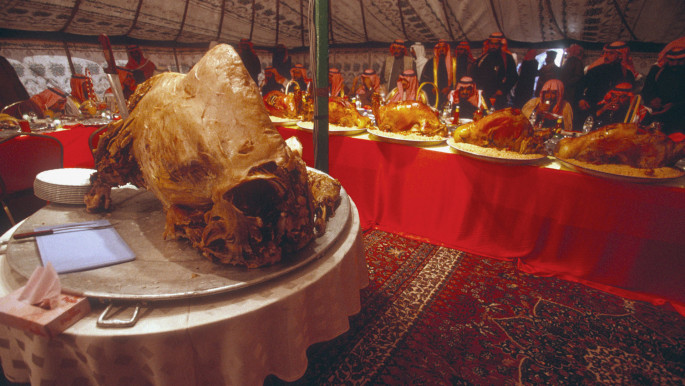
Camel meat ban leads to soaring Saudi lamb prices
Camel meat ban leads to soaring Saudi lamb prices
Blog: The cost of lamb has skyrocketed in Saudi Arabia following a ban on camel slaughter over fears of the rapid spread of the MERS virus, local traders have said.
2 min read
Camel meat and milk are very popular around the Gulf [Getty]
A ban on camel meat has driven up the price of lamb meat by more than 20 percent in Saudi Arabia, al-Araby al-Jadeed's correspondent Khaled al-Shayea has reported.
In September, Saudi Arabia banned the slaughter of camels, after a surge in deaths from the Middle East Respiratory Syndrome coronavirus [MERS] ahead of the annual Hajj pilgrimage.
Camels are thought to be the main carriers of the deadly virus.
The price of lamb has risen to around $580 per head up from $480 the same time last year, local traders have said.
"Even though there's an abundance of different types of livestock, the market for lamb is seeing record sales, pushing the price beyond the reach of the average person," Mohamad al-Majdi, resident of far eastern city of Dammam, told al-Araby al-Jadeed.
"I can't believe what has happened. Last year I used to buy one for $480 now but in the past few months the price has gone up to more than $580," Majdi added.
Lamb trader Jabir al-Shammari also blamed the sudden price hike on limited imports.
"The price has gone up because it has gone up in Jordan, which is the main exporter of sheep to Saudi Arabia," Shammari said.
"It's $300 for a lamb in Joran and us traders have to pay the costs of transport, food and accidental deaths so of course they'll cost over $500," he added.
Camel meat is popular around the Gulf and is commonly eaten at parties and wedding receptions. Camel milk can be found at grocery stores and is prized for its health benefits - as well as being used in some chocolate bars.
The Health Ministry has warned against long-term contact with camels and recommended eating only well-cooked camel meat and boiling the milk before drinking.
The MERS virus has infected 1,279 people in the kingdom since June 2012, when it was first discovered by scientists.
A total of 550 people have died of MERS in the kingdom, according to data from the Saudi health ministry's website as of December 10.
MERS is considered a deadlier but less infectious cousin of the Severe Acute Respiratory Syndrome [SARS] virus that appeared in Asia in 2003 and killed hundreds of people, mostly in China.
In September, Saudi Arabia banned the slaughter of camels, after a surge in deaths from the Middle East Respiratory Syndrome coronavirus [MERS] ahead of the annual Hajj pilgrimage.
 |
|
| Getting the hump: Camel meat is a speciality in the Gulf [Getty] |
The price of lamb has risen to around $580 per head up from $480 the same time last year, local traders have said.
"Even though there's an abundance of different types of livestock, the market for lamb is seeing record sales, pushing the price beyond the reach of the average person," Mohamad al-Majdi, resident of far eastern city of Dammam, told al-Araby al-Jadeed.
"I can't believe what has happened. Last year I used to buy one for $480 now but in the past few months the price has gone up to more than $580," Majdi added.
Lamb trader Jabir al-Shammari also blamed the sudden price hike on limited imports.
"The price has gone up because it has gone up in Jordan, which is the main exporter of sheep to Saudi Arabia," Shammari said.
"It's $300 for a lamb in Joran and us traders have to pay the costs of transport, food and accidental deaths so of course they'll cost over $500," he added.
Camel meat is popular around the Gulf and is commonly eaten at parties and wedding receptions. Camel milk can be found at grocery stores and is prized for its health benefits - as well as being used in some chocolate bars.
The Health Ministry has warned against long-term contact with camels and recommended eating only well-cooked camel meat and boiling the milk before drinking.
The MERS virus has infected 1,279 people in the kingdom since June 2012, when it was first discovered by scientists.
A total of 550 people have died of MERS in the kingdom, according to data from the Saudi health ministry's website as of December 10.
MERS is considered a deadlier but less infectious cousin of the Severe Acute Respiratory Syndrome [SARS] virus that appeared in Asia in 2003 and killed hundreds of people, mostly in China.

![Palestinians mourned the victims of an Israeli strike on Deir al-Balah [Getty]](/sites/default/files/styles/image_684x385/public/2024-11/GettyImages-2182362043.jpg?h=199d8c1f&itok=xSHZFbmc)


![The law could be enforced against teachers without prior notice [Getty]](/sites/default/files/styles/image_684x385/public/2178740715.jpeg?h=a5f2f23a&itok=hnqrCS4x)
 Follow the Middle East's top stories in English at The New Arab on Google News
Follow the Middle East's top stories in English at The New Arab on Google News


